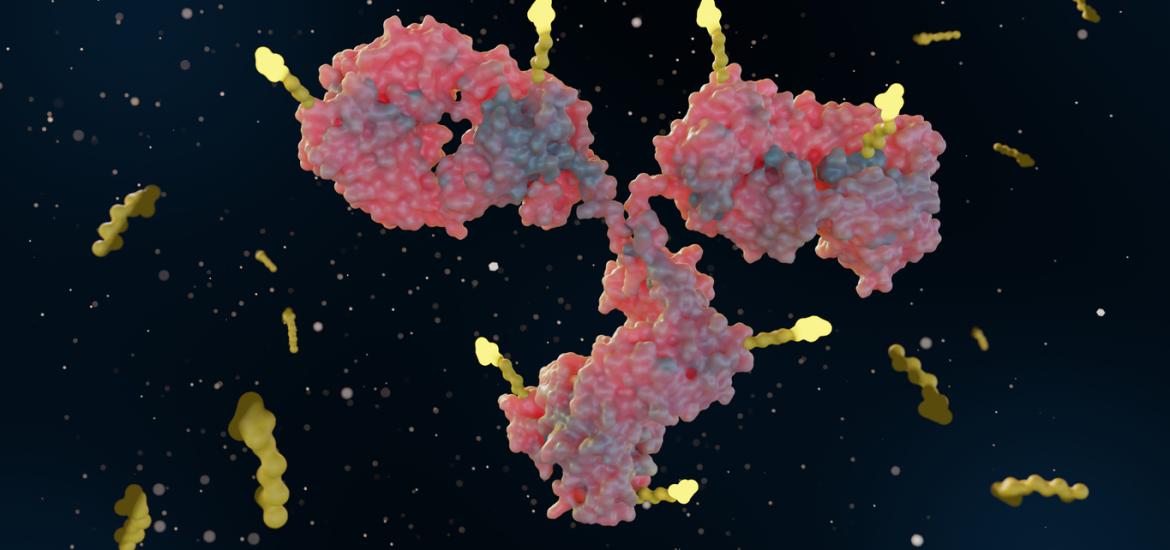
Conjugates enter their first clinical trials
Two Kelun ADCs and two actinium-based radioconjugates start phase 1.
Two Kelun ADCs and two actinium-based radioconjugates start phase 1.

Three months after Merck & Co opted in to a new Kelun-derived ADC, MK-2750/SKB571, the molecule is formally starting phase 1. The study is one of several first-in-human initiations disclosed in the clinicaltrials.gov registry, but the entry sheds no light on its targets, which remain undisclosed.
First clinical studies also include two radioconjugates that use actinium-225 as the isotope. A wholly owned Kelun asset, the anti-B7-H3 ADC SKB500, is also new into the clinic; Merck has rights to that target separately through ifinatamab deruxtecan via its other big ADC deal, with Daiichi Sankyo. That's also the source of patritumab deruxtecan, whose HER3 target is shared with Akeso's AK138D1, also newly into phase 1.
Several ADC players are going after similar targets, so it's no surprise to see new entrants in the HER3 and B7-H3 space, even if these are destined to come rather late to the party. B7-H3 was recently validated by data from BioNTech/DualityBio's BNT342, while last year GSK licensed Hansoh's GSK5764227. The wholly owned YL201, from MediLink – and now Kelun's SKB500 – could soon be in the deal-making frame.
However, in HER3 things haven't gone smoothly, with Merck's patri-dxd filing recently suffering a US complete response letter, embarrassingly over third-party manufacturing. That was based on phase 2 data, and by the time the issues are rectified the project will likely have yielded full data from the phase 3 Herthena-Lung02 study, toplined positive in September.
$38m opt-in
It was in August that Merck opted in to Kelun's SKB571, at the same time as giving up on the anti-Claudin18.2 ADC SKB315/MK-1200. The opt-in was worth $38m up front to Kelun, and SKB571 was said to be an undisclosed bispecific ADC.
The following month the project appeared in Merck's ESMO investor deck under the code MK-2750, and was said to be in phase 1. However, that appears to have been based on the clearance of an IND, with Kelun's actual first-in-human study, in unspecified solid tumours, only getting under way this month, according to the just disclosed listing.
Recently disclosed first-in-human studies*
| Project | Mechanism | Company | Trial | Scheduled start |
|---|---|---|---|---|
| SKB500 | B7-H3 ADC | Kelun | Solid tumours | 13 Dec 2024 |
| HM16390 | IL-2 analogue | Hanmi | Solid tumours | Dec 2024 |
| SKB571/ MK-2750 | Undisclosed bispecific ADC | Kelun/ Merck & Co | Solid tumours | Dec 2024 |
| RYZ801 | 225Ac-labelled GPC3 radioconjugate | Bristol Myers Squibb (ex RayzeBio) | GPC3+ve liver cancer | Dec 2024 |
| ABD-147 | 225Ac-labelled DLL3 radioconjugate | Abdera Therapeutics | 2nd-line SCLC & large cell neuroendocrine carcinoma | Dec 2024 |
| HRS-6208 | Undisclosed | Jiangsu HengRui | Solid tumours | Dec 2024 |
| AK138D1 | HER3 ADC | Akeso | Solid tumours | 26 Feb 2025 |
| MGC028 | Adam9 ADC | MacroGenics | Solid tumours | Mar 2025 |
| ECI830 | Undisclosed** | Novartis | CCNE1-amplified ER+/HER2- breast cancer | 26 Mar 2025 |
| ISM5939 | ENPP1 inhibitor | Insilico Medicine | Solid tumours | 30 Dec 2025 |
Notes: *projects newly listed on the clinicaltrials.gov database between 9 and 16 Dec 2024; **possibly a CDK2 inhibitor.
Meanwhile, with ongoing interest in radiopharmaceuticals, the entry of two projects that use the alpha-emitting isotope actinium-225 will be notable.
The first is RYZ801, now owned by Bristol Myers Squibb after that group bought its originator, RayzeBio, for $4.1bn a year ago. The target of RYZ801, GPC3, will also be of interest since being validated by AbelZeta/AstraZeneca's Car-T construct at this year's ASCO conference.
The second is ABD-147, an anti-DLL3 molecule in development by the private US biotech Abdera, which thus becomes a clinical-stage company. Abdera, which came out of stealth mode in April 2023 with a $142m series A and B financing, claims to be able to design radiopharmaceuticals with "tunable pharmacokinetic properties" to achieve high tumour uptake and reduced toxicity, a live issue for DLL3.
Also among new phase 1 studies is MGC028, an anti-Adam9 ADC that MacroGenics decided to advance into development in March. That move came after its more advanced shot at the Adam9 antigen, izeltabart tapatansine, earlier licensed to ImmunoGen, was discontinued, with no further work undertaken by either MacroGenics or ImmunoGen’s new owner, AbbVie.
And China's Insilico Medicine is taking into phase 1 ISM5939, an inhibitor of ENPP1, which is said to be a superior way of targeting Sting than direct intratumoural agonism, an approach that has disappointed clinically.
1737













